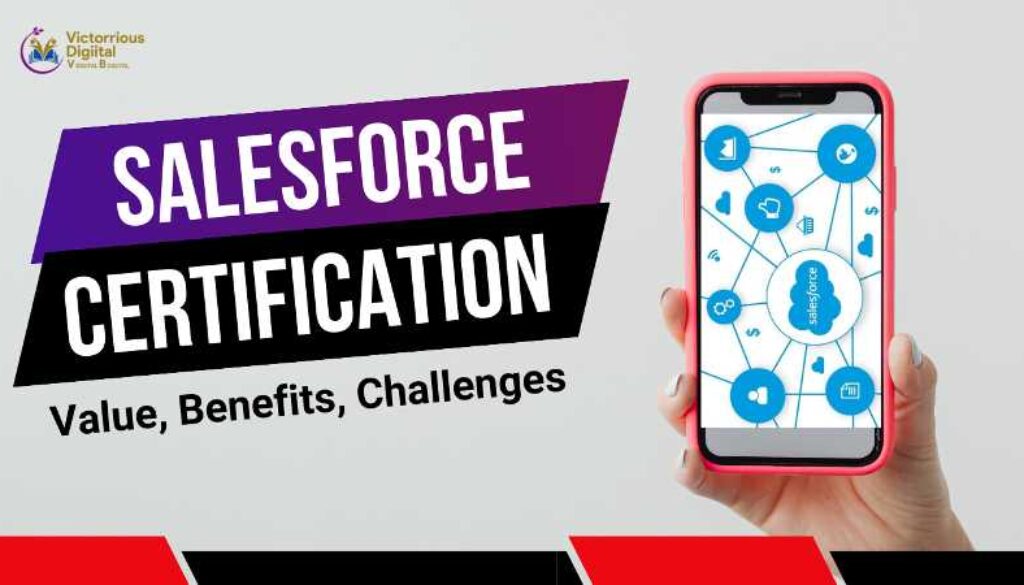Salesforce Certifications: Value, Benefits, and Challenges
As businesses become more digital, many of them rely on Salesforce to manage customer relationships, track sales, and grow their operations. With Salesforce in high demand, more people are thinking about getting Salesforce certifications. But the big question is: Are Salesforce certifications worth it?
In this blog, we’ll explore what Salesforce certifications are, their benefits, potential downsides, and whether they are worth the time, effort, and cost.
Table of Contents
What Are Salesforce Certifications?
Salesforce certifications are official badges awarded to professionals who pass the specific exams. They prove that the person has the knowledge and skills to work with Salesforce software. Salesforce offers certifications for different roles, such as:
- Administrator: Manages Salesforce settings, data, and automations.
- Developer: Creates custom code and apps on Salesforce.
- Consultant: Helps businesses set up Salesforce according to their needs.
- Architect: Designs complex Salesforce systems and integrations.
- Marketer: Uses tools like Marketing Cloud to run campaigns.
To get certified, candidates must study the Salesforce platform and pass an exam. Some certifications need extra effort, like gaining hands-on experience or completing certain projects. If you want to specialize in salesforce and prepare for certifications, you can find a Salesforce Course in Pune or look for a Salesforce institute in Pune that could train you for the required skill sets.
Why Do People Get Salesforce Certifications?
There are many reasons why professionals choose to get certified. Let’s look at a few:
- Career Growth: A certification can make your resume stand out, helping you get noticed by recruiters or get promotions at your current job.
- Increased Knowledge: Studying for the exams forces you to learn how Salesforce works, which helps you become better at using the system.
- Proof of Skills: Certifications are a quick way to show employers that you have specific Salesforce skills.
- Access to Exclusive Resources: Salesforce provides certified professionals with extra learning resources, discounts, and invitations to events like Dreamforce.
How Much Do Salesforce Certifications Cost?
Getting certified isn’t free. Each exam has a fee, ranging from $200 to $400. Some advanced certifications, like the Salesforce Architect, can cost $6,000 or more when you include preparation time, practice materials, and retakes.
There’s also the time investment—studying for some certifications takes weeks or months, depending on your schedule and prior knowledge.
If the professional, who wants to get certified, is a part of a well known and settled organization, then there are a lot of organizations that provide you the opportunity to get certified in specific areas without paying for it themselves.
Pros of Salesforce Certifications
- Better Job Opportunities: Salesforce-certified professionals are highly demanded by companies. Some jobs, especially roles like Salesforce Administrator or Consultant, require candidates to have specific certifications. With a badge on your resume, recruiters know you have the right skills.
- Higher Salaries: Certified professionals often earn more than those without certifications. Salesforce developers, consultants, and architects with certifications can earn 10-20% more than their non-certified peers. Specialized roles, like Marketing Cloud experts or CPQ specialists, also come with higher pay.
- Practical Knowledge: Preparing for a Salesforce certification isn’t just about reading theory. You also need to complete hands-on exercises using tools like Trailhead, Salesforce’s learning platform. This practice helps you apply what you learn directly in real-world situations.
- Flexibility to Switch Roles: Salesforce offers certifications for many different areas—administration, development, consulting, and more. This makes it easier for professionals to switch career paths. For example, an administrator can pursue development-related certifications and move into a technical role.
- Recognition in the Salesforce Community: Salesforce certifications also earn you recognition within the Trailblazer Community—Salesforce’s user network. Being part of this community gives you access to events, forums, and mentors who can help you grow your career.
Cons of Salesforce Certifications
While Salesforce certifications offer many benefits, there are also a few challenges to consider:
- High Costs and Time Commitment: The fees for exams can add up, especially if you pursue multiple certifications. Additionally, studying for the exams requires a lot of time and focus, which can be difficult if you’re already working full-time or balancing other responsibilities.
- Ongoing Learning Required: Salesforce updates its platform three times a year with new features. While the company no longer requires formal recertification exams, you still need to stay up-to-date with the latest releases to remain relevant. This means ongoing learning is essential.
- Not a Replacement for Experience: While certifications show that you have knowledge, many employers also look for real-world experience. A certified professional with no practical experience might still struggle to perform in certain roles.
- Overemphasis on Certifications: In some cases, people chase certifications for the sake of collecting badges, without focusing on true learning. This can reduce the value of certifications if employers think candidates are “paper-certified” but lack deep understanding.
Get the Most Out of Your Salesforce Certification
- Choose the Right Certification for Your Career Goals: Instead of collecting multiple certifications, focus on the ones that match your career path. For example, if you want to work with sales teams, go for Salesforce Administrator or Sales Cloud Consultant.
- Get Hands-on Experience: Use Trailhead playgrounds and other practice tools to build real-world skills. Try volunteering for projects where you can apply your knowledge because experience makes a big difference.
- Join the Salesforce Community: Engage with the Trailblazer Community to learn from others. Attend meetups, ask questions in forums, and participate in Salesforce events to expand your network.
- Stay Updated with Platform Changes: Salesforce releases new features and tools three times a year. Keep an eye on updates to make sure your knowledge stays current, even after getting certified.
Also Read – A Beginner’s Guide to Salesforce Marketing Cloud
Who Benefits the Most from Salesforce Certifications?
Salesforce certifications are useful for many types of professionals. Let’s look at some groups that benefit the most:
Job Seekers: Certifications help people new to Salesforce stand out in the job market.
Career Switchers: Professionals moving from non-technical roles can use Salesforce certifications to pivot into tech careers.
Freelancers and Consultants: Independent contractors can build trust with clients by showing they are certified experts.
Current Employees: Employees working with Salesforce at their job can earn certifications to secure promotions or raises.
Are Salesforce Certifications Worth It ?
The answer depends on your goals, but for most people, Salesforce certifications are worth it. Here’s why:
- The demand for Salesforce professionals is growing, and companies prefer hiring candidates with certifications. Some companies make it mandatory to have a certificate for a specific role.
- Certified professionals tend to earn higher salaries.
- Certifications provide structured learning, helping you build both theoretical knowledge and practical skills.
- They also open doors to new roles, promotions, and networking opportunities within the Salesforce community.
However, it’s important to remember that certifications alone aren’t enough. They should be combined with hands-on experience to truly unlock their value. If you’re willing to invest time, effort, and money into learning, Salesforce certifications can be a great career booster.
Conclusion
Salesforce certifications offer many benefits, such as better job opportunities, higher salaries, and practical skills. They also provide access to the vibrant Trailblazer Community and help professionals stay updated with the latest Salesforce developments.
However, they do require a significant investment of time and money. While certifications are a great way to kickstart a career, they shouldn’t be seen as a shortcut. Real-world experience, continuous learning, and hands-on practice are equally important.
If you’re serious about building a career in Salesforce, getting certified is definitely worth it. To get started, you can enroll in a Salesforce training institute in Pune, or opt for online Salesforce training to fit your schedule and learning style.




